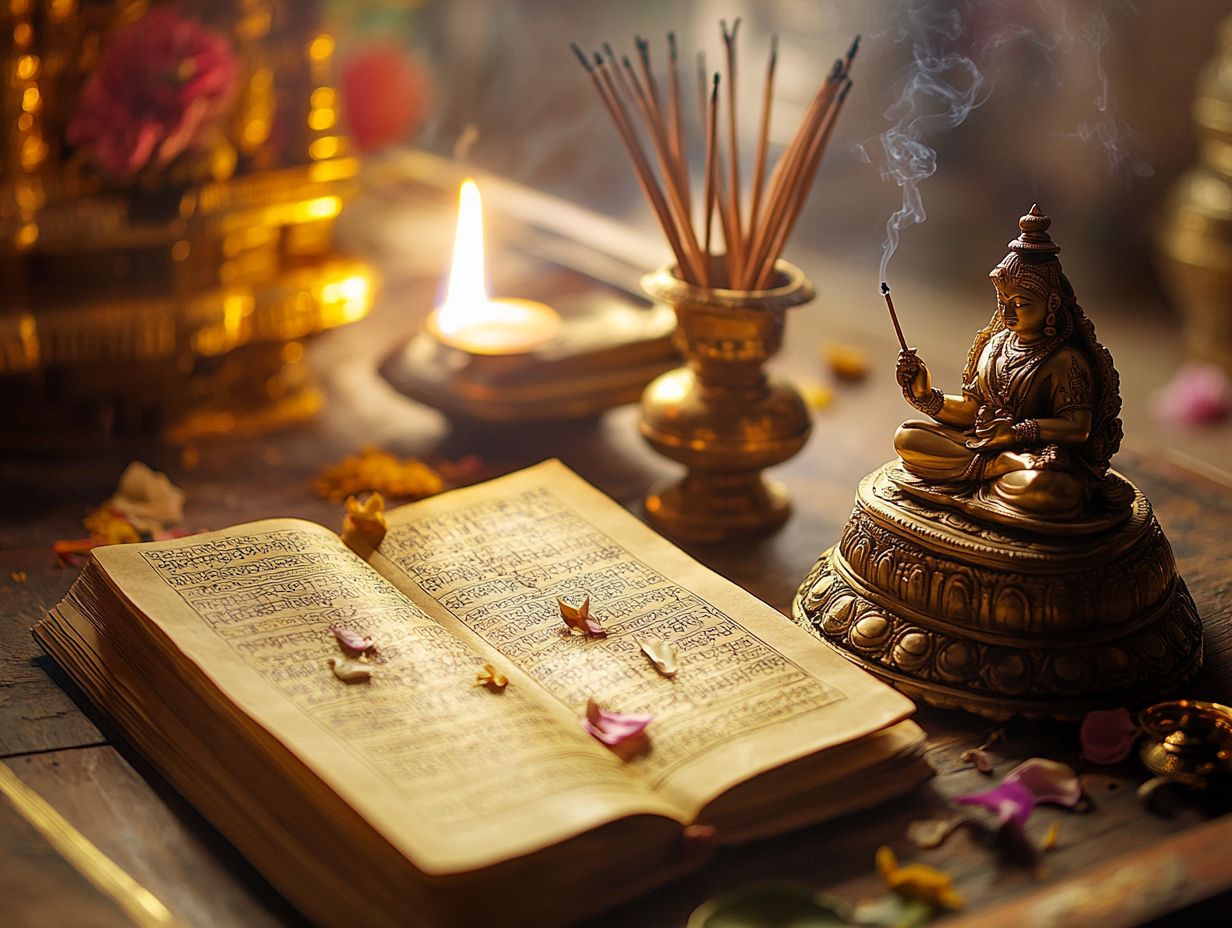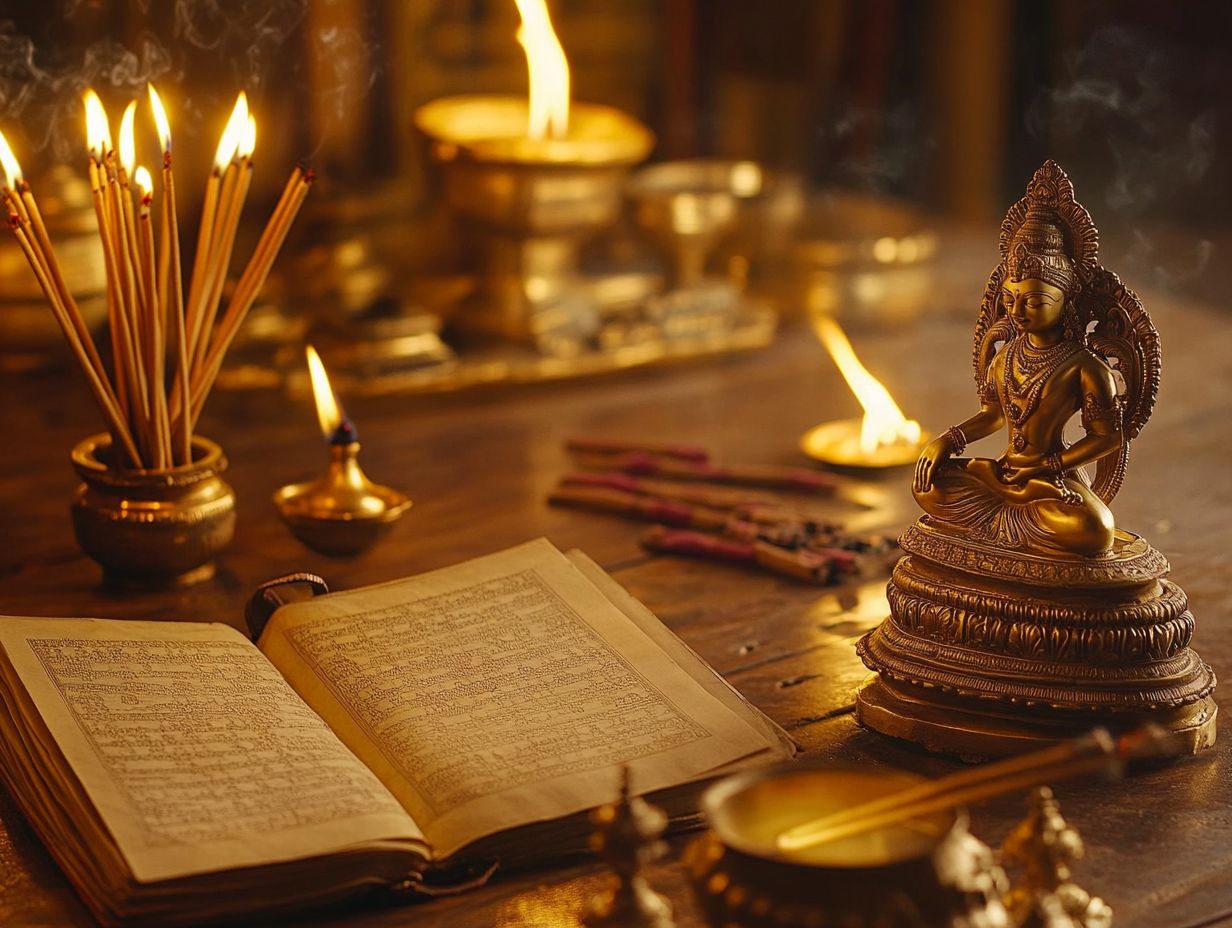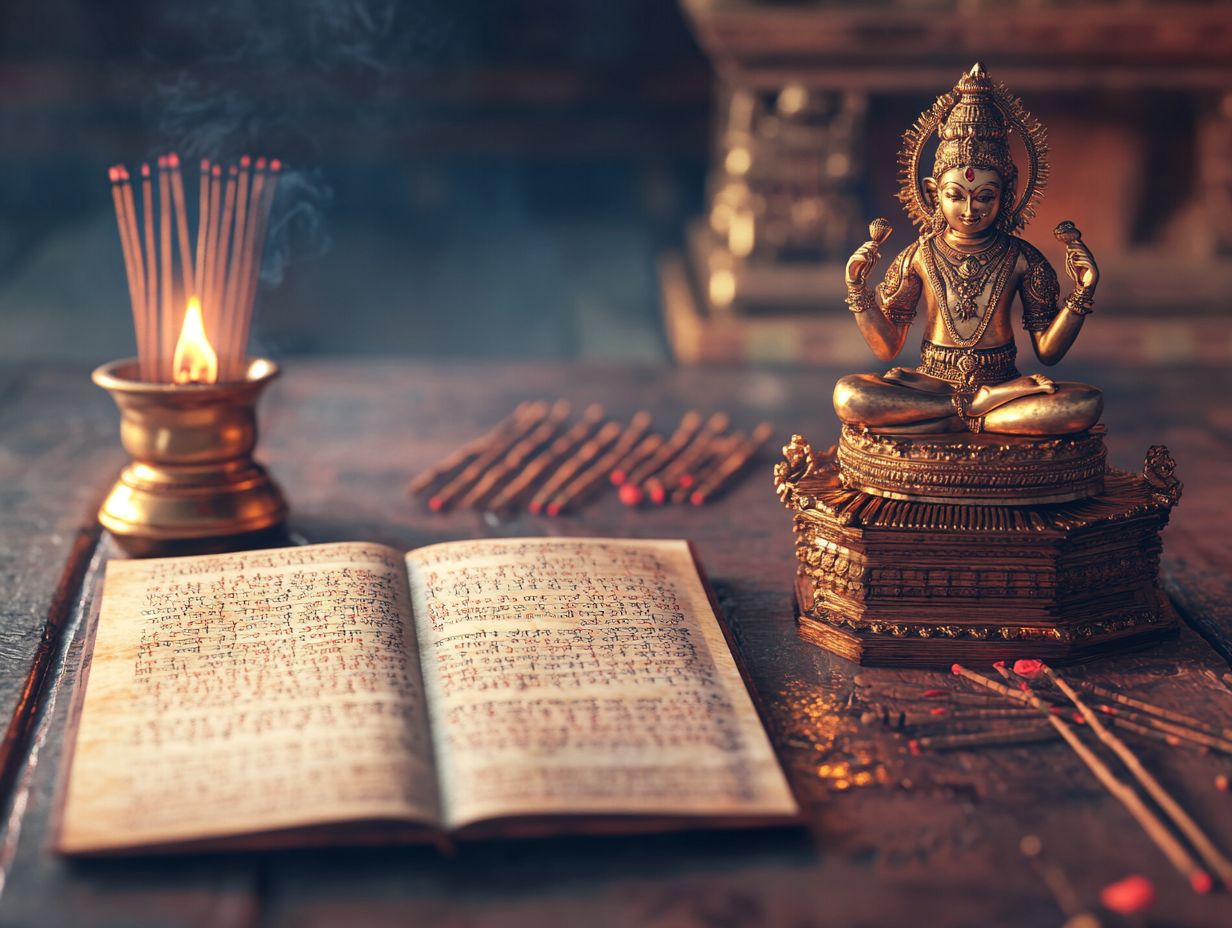When Did Hinduism Begin?
Hinduism, recognized as one of the world’s oldest religions, presents a rich and intricate tapestry of history, beliefs, cultural practices, and rituals that have gracefully evolved over millennia, encompassing sacred texts and deities that resonate deeply with its followers.
This exploration delves into the origins of Hinduism, meticulously tracing its beginnings, including its roots in the ancient Indus Valley Civilization, and the significant historical events that have influenced its development. Various theories regarding its inception, along with the historical evidence that illuminates its roots, will be thoughtfully examined.
Additionally, the adaptation of Hinduism over time and across diverse cultures will be discussed, highlighting its core beliefs, sacred texts like the Upanishads, and rituals, alongside its influence on cultural heritage and spiritual traditions. This enlightening journey invites one to immerse themselves in the captivating world of Hinduism.
What is the History of Hinduism?

The history of Hinduism presents a rich tapestry intricately woven through ancient traditions, profound philosophical discourse, and a myriad of cultural practices that extend over thousands of years, reaching back to the early civilizations of ancient India, particularly the Indus Valley Civilization.
This enduring religious tradition, commonly known as Sanatana Dharma, encompasses a vast array of beliefs, rituals, and sacred texts, including the Vedas and Upanishads, which serve as the foundational pillars of Hindu philosophy and spirituality. This religion also involves complex understandings of dharma, karma, and moksha.
What are the Origins of Hinduism?
The origins of Hinduism can be traced back to the ancient Indus Valley Civilization, around 2500 BCE, where archaeological evidence reveals the early development of religious practices, Hindu symbols, and cultural symbols that would eventually evolve into the rich tapestry of beliefs and rituals characteristic of Hinduism today.
During this extraordinary period, various seals and figurines unearthed at sites such as Mohenjo-Daro and Harappa offer valuable insights into the spiritual lives and religious practices of these early inhabitants. The depiction of yoga-like poses and symbols that resonate with later Hindu motifs underscores a continuity of thought and significance that is both compelling and foundational.
The emergence of complex rituals, evident in pottery and sacred artifacts, suggests an early inclination toward worship and a deep reverence for natural elements. As these practices transitioned into the Vedic period, around 1500 BCE, the development of the Rigveda marked a significant turning point, introducing structured rituals and philosophies that have profoundly shaped the growth of Hinduism over millennia. To learn more about its origins, explore where Hinduism started.
What are the Major Historical Events in Hinduism?
Major historical events in Hinduism have significantly influenced its evolution, with the impact of various sects, the rise of reform movements, crucial intercultural exchanges, and the influence of historical figures all weaving together a rich tapestry of beliefs and practices within this ancient religion.
Over the centuries, the emergence of diverse sects such as Vaishnavism and Shaivism has introduced varying interpretations of deities and their worship, showcasing the religion’s inherent adaptability. Reform movements spearheaded by influential figures like Swami Vivekananda and Mahatma Gandhi have aimed to address pressing social issues, emphasizing moral values and the pursuit of spiritual equality.
Interactions with Buddhism, Jainism, and, later, Islam and Christianity have further catalyzed syncretic practices and philosophies, deepening the complexities of Hinduism. The dynamic interplay of these historical events highlights how Hinduism continues to adapt and thrive, intricately intertwining itself within the social and cultural fabrics of India and beyond, influencing spirituality and cultural significance.
When Did Hinduism Begin?
Determining the origins of Hinduism presents a complex challenge, as its roots trace back to the early civilization of the Indus Valley, involving an intricate historical timeline. This intricate timeline interlaces numerous historical contexts, religious evolution, and philosophical advancements that have unfolded over several millennia.
What are the Different Theories about the Origin of Hinduism?
Numerous theories regarding the origin of Hinduism present distinct viewpoints, each rooted in historical figures, intercultural exchanges, and the syncretism between indigenous beliefs and incoming spiritual teachings from diverse cultures, reflecting a complex religious evolution.
The intricate tapestry of Hinduism is crafted from a multitude of influences accumulated over millennia, embodying the dynamic interplay of geography, philosophy, and spirituality. Influential historical figures, such as the sages who authored the Upanishads and key texts like the Bhagavad Gita, were instrumental in shaping its foundational doctrines.
Intercultural exchanges, whether through trade routes or pilgrimages, facilitated the incorporation of novel ideas, practices, and deities into the religion. This fluidity is vividly illustrated by the syncretic nature of Hindu beliefs, which often integrate elements from Buddhism, Jainism, and various tribal traditions. Such inclusivity fosters a rich, cohesive, and ever-evolving spiritual landscape, reflecting the adaptability and depth of Hinduism over time.
What is the Historical Evidence of the Beginning of Hinduism?

The historical evidence surrounding the origins of Hinduism is drawn from a diverse array of sources, including archaeological discoveries, ancient texts such as the Vedas, and Vedic rituals that illuminate the spiritual practices of early civilizations alongside their sacred geography, including sites like the Ganges River.
These sources weave together an intricate tapestry of beliefs and rituals that characterized the spirituality of ancient Indian societies. Archaeological excavations reveal ceremonial sites and artifacts, showcasing the tangible expressions of religious life, while ancient texts offer a literary framework that captures the philosophical foundations of the faith.
An analysis of urban planning within Indus Valley cities, in conjunction with references found in the Vedas, narrates a compelling tale of how early practitioners intertwined their spirituality with daily existence, reflecting a rich cultural identity deeply connected to their environment.
The amalgamation of these insights significantly enhances the understanding of how Hinduism developed into a complex and enduring tradition.
How has Hinduism Evolved over Time?
The evolution of Hinduism over time reveals a dynamic journey characterized by significant developments, regional variations, and contributions from philosophical systems like Brahmanism.
This has resulted in a rich tapestry of beliefs and practices, highlighting the religion’s remarkable adaptability and resilience in the contemporary world.
What are the Major Developments in Hinduism?
Significant advancements in Hinduism encompass the Hindu renaissance, a period that catalyzed notable religious evolution, the rise of sectarian divisions, and a revitalized focus on ethical practices rooted in both ancient teachings and contemporary interpretations. This period also saw a reemphasis on dharma and core philosophical systems.
This era represented a profound transformation, as influential thinkers, drawing inspiration from a confluence of Western philosophies and traditional values, endeavored to reinterpret age-old doctrines, thereby reshaping the spiritual landscape. As adherents began to delve into various sects and philosophies, diverse interpretations of fundamental beliefs surfaced, fostering both collaboration and discord among different communities.
The ramifications of these developments not only prompted a deeper engagement with ethical living grounded in dharma but also illuminated the tensions that emerge when innovative ideas confront established norms. Ultimately, this dynamic interplay has been instrumental in driving the evolution of beliefs within this ancient faith.
How has Hinduism Adapted to Different Societies and Cultures?
Hinduism’s remarkable ability to adapt to a variety of societies and cultures can be attributed to its intrinsic flexibility, which facilitates the incorporation of diverse cultural influences, promotes syncretism, and enables it to flourish within various diaspora communities around the world, including Hindu communities in the Caribbean and North America.
This adaptability allows the religion to resonate deeply with local traditions, beliefs, and practices, resulting in a rich tapestry of rituals and philosophies that embody a unique fusion of ideas. In regions such as the Caribbean and North America, Hindu diaspora communities have skillfully blended traditional customs with local elements, ensuring that their cultural identity remains robust while simultaneously evolving to meet the demands of new environments.
Such cross-pollination not only aids in the preservation of core Hindu teachings but also enhances the global understanding of its principles, highlighting a dynamic and multifaceted religious heritage.
What are the Core Beliefs and Practices of Hinduism?
The foundational beliefs and practices of Hinduism encompass a diverse array of pivotal concepts, including karma, dharma, and moksha, as well as rituals, meditation, and yoga.
This intricate spiritual tradition is further enriched by a vibrant tapestry of rituals and ceremonies that embody its essence.
What are the Key Concepts in Hinduism?

Key concepts in Hinduism, including karma, dharma, and moksha, along with the understanding of Brahman as the ultimate reality, constitute the philosophical foundation of this ancient tradition and serve as a guiding light for followers on their spiritual journey. Additionally, Hindu scriptures such as the Puranas, Mahabharata, and Ramayana offer rich narratives that elaborate on these concepts.
These interconnected principles provide profound insights into the nature of existence and the individual’s place within the vast cosmic order. Karma, the law of cause and effect, intricately shapes life experiences based on actions taken in previous lives, thereby underscoring the importance of personal responsibility and moral choices in Hinduism.
Dharma signifies the ethical duties and responsibilities that align with one s stage of life and societal role, reinforcing the notion that fulfilling these responsibilities is essential for maintaining harmony. These duties are rooted in the ancient religion of Hinduism.
Moksha represents the ultimate liberation from the cycle of birth and death, standing as an aspirational goal achieved through self-realization and the understanding of one s unity with Brahman. This concept is central to Hindu philosophy and spiritual traditions.
Collectively, these concepts form a comprehensive framework that influences rituals, social customs, and spiritual practices among Hindu followers, enriching their quest for a meaningful existence. The origins of these ideas can be traced back to the Indus Valley Civilization and the Vedic period.
What are the Major Hindu Scriptures?
Major Hindu scriptures, including the Vedas, Upanishads, Puranas, and dharmashastras, serve as the cornerstone of the spiritual landscape, articulating the teachings, rituals, and ethical principles that are central to Hindu beliefs and practices. These sacred texts, such as the Rigveda, are integral to the historical timeline of Hinduism.
These ancient texts not only delineate the core philosophies that govern personal conduct and societal norms but also enrich the intricate cultural tapestry of Hinduism, offering a multitude of interpretations regarding the essence of life and the universe. The Vedas, often esteemed as the ultimate authority, provide the foundation for rituals and sacrifices, while the Upanishads embark on a profound exploration of metaphysics, probing the nature of reality and the self.
Conversely, the Puranas weave together mythology and divine history, shedding light on the cosmic order and the moral dilemmas faced by individuals. Meanwhile, the dharmashastras lay down legal and ethical frameworks, guiding individuals in their duties and responsibilities within society. These texts also highlight the significance of deities such as Brahma, Vishnu, and Shiva.
Collectively, these scriptures wield a profound influence over the daily lives of practitioners, shaping their rituals, beliefs, and ethical outlooks, thereby ensuring a rich and enduring spiritual legacy.
What are the Main Practices and Rituals in Hinduism and their Cultural Significance?
The primary practices and rituals in Hinduism encompass a rich tapestry of activities, including meditation, yoga, asceticism, and the celebration of lively festivals, all of which play an essential role in the spiritual lives of devotees. These religious practices are deeply rooted in Hindu philosophy and cultural heritage.
These practices not only deepen one’s connection with the divine but also cultivate a sense of community among practitioners. Meditation, for example, provides a pathway to inner peace and self-realization, enabling individuals to calm their minds and connect with their true essence. This practice is central to achieving spiritual awakening and enlightenment.
Yoga, often described as the union of body and spirit, harmonizes physical well-being with mental clarity, further enriching the spiritual journey.
Asceticism promotes discipline and detachment from material possessions, steering devotees toward a focus on their higher purpose. Meanwhile, festivals inject joy and vibrancy into religious life, celebrating the diverse deities and narratives that form the foundation of the Hindu identity.
Together, these elements create a holistic experience that fosters both individual growth and communal connection.
Frequently Asked Questions
When Did Hinduism Begin?
Hinduism is believed to have originated somewhere between 2300-1500 BCE in the Indus Valley civilization, making it one of the world’s oldest religions.
Is there a specific date for the beginning of Hinduism?

No, there is no specific date for the beginning of Hinduism as it is a complex and diverse religion that has evolved over thousands of years. Its origins can be traced back to ancient civilizations and have continuously integrated various beliefs and practices.
What were the early beliefs and practices of Hinduism?
The early beliefs and practices of Hinduism revolved around the worship of nature, ancestors, and spirits, and the performance of sacrifices and rituals. These indigenous beliefs laid the foundation for the rich spiritual traditions and cultural practices of Hinduism.
What major events or figures influenced the development of Hinduism and its historical timeline?
The Aryan migration, the Vedic texts, the composition of ancient scriptures like the Mahabharata and Ramayana, and the rise of the Hindu gods Shiva and Vishnu are major events and figures that influenced the development of Hinduism.
When did Hinduism, an ancient religion, become a formalized religion?
Hinduism became a formalized religion with the codification of the Vedas and the Upanishads around 600 BCE, marking an important milestone in its historical timeline.
How has Hinduism evolved over time?
Over time, Hinduism has evolved and incorporated new beliefs and practices, such as the worship of deities such as Shiva and Vishnu, the concept of karma and reincarnation, and the importance of devotion and meditation. This religious evolution reflects the dynamic nature of Hindu philosophy and spiritual traditions.
